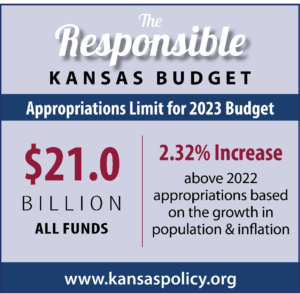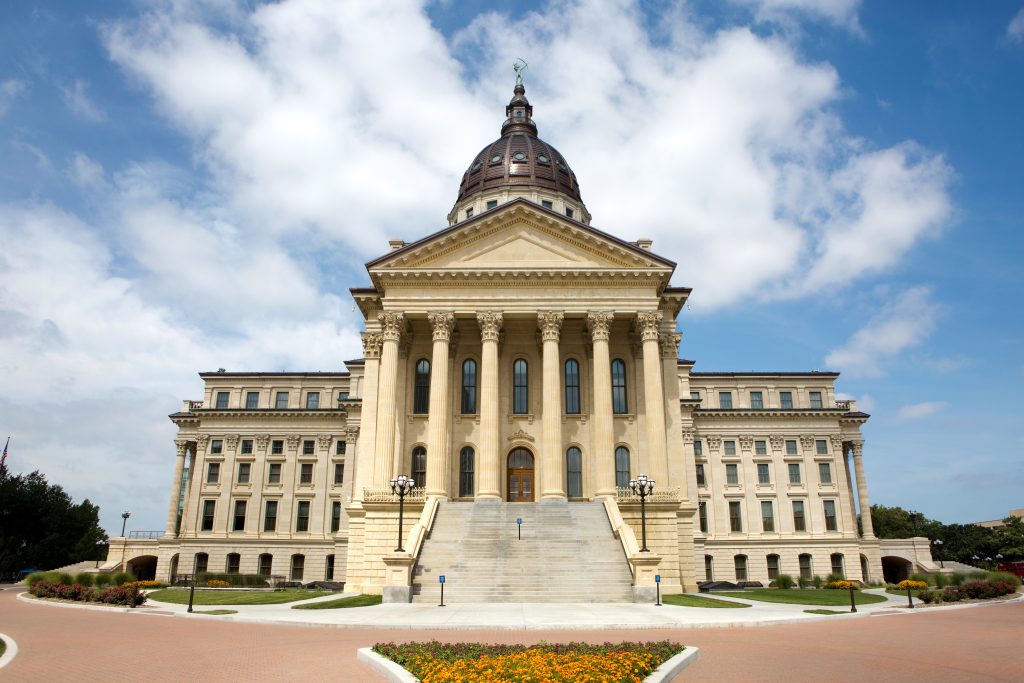The state of Kansas has experienced what are arguably excessive monthly tax collections over the past year. Last month alone exceeded expectations by 7.8%. This comes as a backdrop for the upcoming legislative session where ideas such as eliminating the sales tax on food and offering a $250 tax rebate have been pitched by Governor Laura Kelly. Beyond these proposals for this year, legislators have an opportunity to approach the budgeting process differently with this excess cash.
Kansas has an opportunity to cement strong budgeting practices. Kansas Policy Institute is releasing the Responsible Kansas Budget in conjunction with our colleagues at the Texas Public Policy Foundation. This aims to be a model which limits the growth of government spending to the sum of the state’s population growth and inflation. In 2021, Kansas’ CPI inflation increased 2.36%. At the same time, Kansas’ population growth declined .04%. The sum of these values, a 2.32% increase, would serve as the maximum growth rate for All Funds appropriations in FY 2023. Since Kansas’ All Funds budget for FY 2022 is $20.5 billion, the RKB in FY 2023 would make the budget a maximum of $21.0 billion.
 Limiting the growth of spending limits the growth of taxation. After the implementation of policies similar to the RKB as part of the Texas Public Policy Foundation’s Conservative Texas Budget, the growth of total spending between 2016 to 2023 in Texas was less than half of the average growth of the prior six budgets. This is important because lowering taxation, and by extension lower spending, gives Kansas families more opportunities to choose what they want to do with their money. Lower taxation is key to a healthy business environment with job creation and new wealth entering the community. Controlling spending is about keeping money in Kansans’ pockets.
Limiting the growth of spending limits the growth of taxation. After the implementation of policies similar to the RKB as part of the Texas Public Policy Foundation’s Conservative Texas Budget, the growth of total spending between 2016 to 2023 in Texas was less than half of the average growth of the prior six budgets. This is important because lowering taxation, and by extension lower spending, gives Kansas families more opportunities to choose what they want to do with their money. Lower taxation is key to a healthy business environment with job creation and new wealth entering the community. Controlling spending is about keeping money in Kansans’ pockets.
Vance Ginn, the chief economist at Texas Public Policy Foundation and co-author of the report, said, “The ultimate burden of government is how much it spends of taxpayer dollars. This is why any increase in the state budget should be less than the average taxpayer’s ability to pay for it, as measured by population growth plus inflation, which is what the Responsible Kansas Budget sets as a maximum threshold on the state’s upcoming budget. We have seen the success of this approach in Texas, resulting in increased opportunities for people to flourish for many years. I’m excited to partner with Kansas Policy Institute in ensuring Kansas is a great place to raise a family and start a business.”
Legislators have the power to control taxing and spending in an unpredictable economy. It is the government’s responsibility not to put an undue tax burden on citizens by controlling spending. Having a more responsible budget keeps more money in taxpayers’ wallets, promotes business investment, and helps slow government creep into peoples’ lives.
View the Responsible Kansas Budget in our report below.





